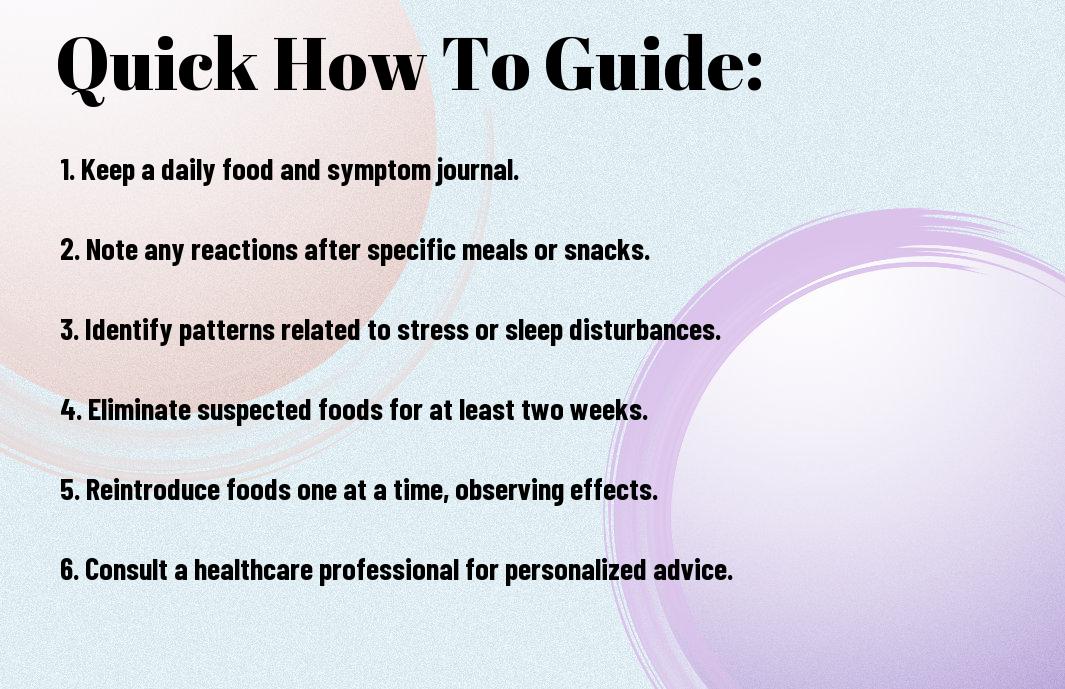To take control of your health, understanding your body is key. You need to identify what causes chronic inflammation in your system, as it can lead to serious health issues. By pinpointing your personal triggers, you can make informed decisions to reduce inflammation and improve your overall wellbeing. You will learn how to listen to your body and make positive changes to alleviate pain and discomfort. This knowledge will empower you to take charge of your health and thrive.

Key Takeaways:
To identify your personal inflammation triggers, consider the following points:
- Keep a symptom journal to track when inflammation occurs and potential triggers, such as certain foods or environmental factors.
- Pay attention to physical sensations, like pain or swelling, and emotional changes, such as stress or anxiety.
- Be aware of dietary triggers, including gluten, dairy, or processed foods, which can cause inflammation in some individuals.
- Consider lifestyle factors, such as sleep patterns, exercise habits, and exposure to pollutants, which can contribute to inflammation.
- Consult with a healthcare professional to discuss your medical history and develop a personalized plan to identify and manage your inflammation triggers.

Understanding Inflammation Triggers
To understand your personal inflammation triggers, you need to know what causes inflammation in your body. Inflammation is a natural response, but it can become a problem when it persists.
What are Inflammation Triggers
There’s a wide range of factors that can trigger inflammation, including diet, stress, and environmental toxins. You may be exposed to these triggers on a daily basis, making it imperative to identify them.
Why Identifying Triggers is Crucial
Identifying the sources of your inflammation is key to managing your overall health. You can take control of your well-being by pinpointing what causes chronic inflammation, which can lead to serious health issues if left unchecked.
With a clear understanding of your personal inflammation triggers, you can develop a personalized plan to mitigate their effects. You will be able to make informed decisions about your lifestyle and diet, allowing you to reduce inflammation and improve your overall wellness. By taking charge of your inflammation triggers, you can protect yourself from potential health risks and maintain a healthy balance in your body.
Common Factors that Contribute to Inflammation
One of the main reasons you experience inflammation is due to various factors, including:
- genetics
- lifestyle
Learn more about How to Fight Off Common Triggers of Inflammation. Perceiving your body’s response to these factors is key.
Dietary Factors
Apart from other factors, your diet plays a significant role, including:
- processed foods
- sugary drinks
Knowing how these affect your body will help you make informed choices.
Environmental Factors
Almost always, pollution and stress contribute to your inflammation, including:
- air quality
- noise
Thou will be better equipped to manage your inflammation by understanding these factors.
that being said, when considering
Environmental Factors
, you should be aware of:
- toxins
- radiation
Thou will have a healthier life if you minimize your exposure to these harmful elements.

How to Identify Your Personal Inflammation Triggers
Despite the complexity of inflammation, understanding its triggers is key to managing its effects. To learn more about inflammation, visit What Is Inflammation? Types, Causes & Treatment to gain insight into the condition.
Keeping a Symptom Journal
One effective way to track your inflammation triggers is by keeping a symptom journal, where you note down your diet, exercise, and stress levels to identify patterns and correlations with your inflammation symptoms.
Elimination Diet Tips
Personally, you can try an elimination diet to identify your triggers. Consider the following:
- Foods that commonly trigger inflammation, such as gluten and dairy
After identifying your triggers, you can take steps to mitigate their impact on your body.
Additional Elimination Diet Tips
Symptom tracking is important during an elimination diet. You should consider the following:
- Processed foods that may exacerbate inflammation
- Sugar intake, which can trigger inflammatory responses
After analyzing your symptoms and trigger foods, you can create a personalized plan to reduce inflammation and improve your overall well-being.
Lifestyle Tips to Reduce Inflammation
Now, to manage inflammation, you can start by implementing the following lifestyle changes:
- Healthy diet
. After making these changes, you will be on your way to a healthier life.
Stress Management Techniques
Towards minimizing stress, you can use various techniques such as meditation and deep breathing to calm your mind and body.
Exercise and Sleep Recommendations
There’s a significant link between exercise, sleep, and inflammation levels, so it’s important to prioritize both.
Stress can lead to chronic inflammation, which is dangerous for your overall health. You can use exercise as a positive way to manage stress and reduce inflammation. By getting enough sleep and engaging in regular physical activity, you can help your body function at its best and minimize inflammation.
Medical Factors to Consider
Unlike other factors, medical factors can have a significant impact on your inflammation levels. Consider the following:
- Genetics
- Autoimmune disorders
You can learn more about inflammation at All about inflammation – Harvard Health. Knowing your medical history is key to understanding your inflammation triggers.
Pre-Existing Conditions
Conditions such as arthritis and diabetes can increase your inflammation levels, making it necessary to monitor your condition and adjust your lifestyle accordingly.
Medication Side Effects
Medically speaking, certain prescriptions can have pro-inflammatory effects, so it’s necessary to discuss your options with your doctor.
With proper guidance, you can minimize the risk of adverse reactions and find alternative treatments that won’t exacerbate your inflammation. Being aware of potential side effects and taking preventative measures can help you better manage your inflammation and improve your overall well-being.

Additional Tips for Managing Inflammation
Once again, managing inflammation requires a multi-faceted approach, including lifestyle changes and self-care practices. Consider the following:
- Diet
- Exercise
. Perceiving your body’s unique needs is key to developing an effective plan.
Nutrition and Supplementation
Although a healthy diet is vital, you should also consider supplementation to support your overall well-being, reducing inflammation and promoting healing.
Mind-Body Therapies
Certainly, mind-body therapies such as meditation and yoga can help you manage stress, a major inflammation trigger.
The practice of mind-body therapies can have a profound impact on your overall health, as it reduces stress and anxiety, promoting a sense of well-being and balance in your life, allowing you to better manage inflammation and maintain a healthy lifestyle.
Final Words
To wrap up, you now have the knowledge to identify your personal inflammation triggers, taking control of your health. You can monitor your body’s responses to different factors, such as diet and environment, to pinpoint what causes inflammation in your body. By being aware of your unique triggers, you can make informed decisions to minimize their impact, reducing inflammation and promoting overall well-being. You are empowered to take charge of your health, making conscious choices to improve your quality of life.
FAQ
Q: What are personal inflammation triggers and why are they important to identify?
A: Personal inflammation triggers are specific factors that can cause or exacerbate inflammation in an individual’s body. Identifying these triggers is important because it allows individuals to take proactive steps to prevent or reduce inflammation, which can help alleviate symptoms of various health conditions, such as arthritis, digestive issues, and skin problems. By understanding what triggers inflammation in their own body, individuals can make informed lifestyle choices to reduce their exposure to these triggers and promote overall health and well-being.
Q: How can I determine what my personal inflammation triggers are?
A: To identify your personal inflammation triggers, start by keeping a symptom journal to track when inflammation occurs and what you were doing, eating, or exposed to beforehand. Also, consider common triggers such as certain foods, stress, lack of sleep, and environmental toxins. You can also consult with a healthcare professional to discuss your symptoms and medical history, and potentially undergo testing to identify specific triggers. Additionally, try eliminating potential triggers one at a time to see if symptoms improve, a process known as an elimination diet.
Q: What are some common inflammation triggers that I should be aware of?
A: Common inflammation triggers include certain foods such as gluten, dairy, and processed meats, as well as food additives and preservatives. Environmental toxins like pollution, pesticides, and heavy metals can also trigger inflammation. Stress, lack of sleep, and sedentary lifestyle are other potential triggers. Furthermore, some individuals may experience inflammation due to medical conditions, infections, or hormonal imbalances. It’s vital to be aware of these potential triggers and take steps to minimize exposure or manage their impact.
Q: How can keeping a symptom journal help me identify my personal inflammation triggers?
A: Keeping a symptom journal can help you identify patterns and correlations between your activities, diet, and environment and the occurrence of inflammation symptoms. By tracking your symptoms, you can start to notice when inflammation occurs and what might have triggered it. Write down everything, from what you eat and drink to your stress levels, sleep quality, and physical activity. Over time, patterns may emerge, allowing you to pinpoint specific triggers and make informed decisions about how to manage them. Be sure to include details like the date, time, and severity of symptoms, as well as any potential triggers you suspect may be contributing to the inflammation.
Q: What steps can I take to reduce or eliminate my personal inflammation triggers?
A: To reduce or eliminate your personal inflammation triggers, start by making dietary changes, such as adopting an anti-inflammatory diet rich in whole, unprocessed foods like fruits, vegetables, and whole grains. Stay hydrated by drinking plenty of water, and aim to get regular exercise, such as walking or yoga, to help reduce stress and promote overall health. Additionally, prioritize getting enough sleep, practicing stress-reducing techniques like meditation or deep breathing, and limiting exposure to environmental toxins. Consider working with a healthcare professional to develop a personalized plan to address specific triggers and promote overall wellness. By taking proactive steps to reduce or eliminate your personal inflammation triggers, you can help alleviate symptoms and promote long-term health and well-being.



